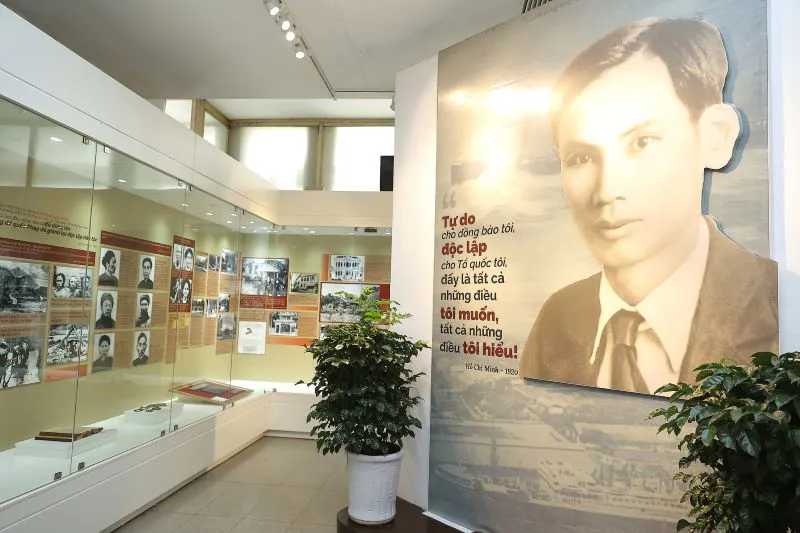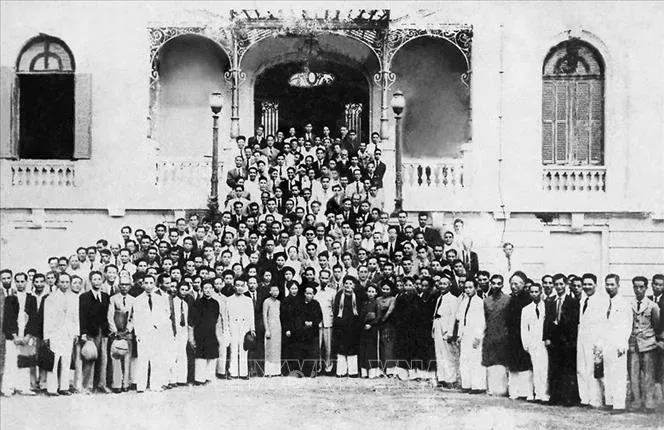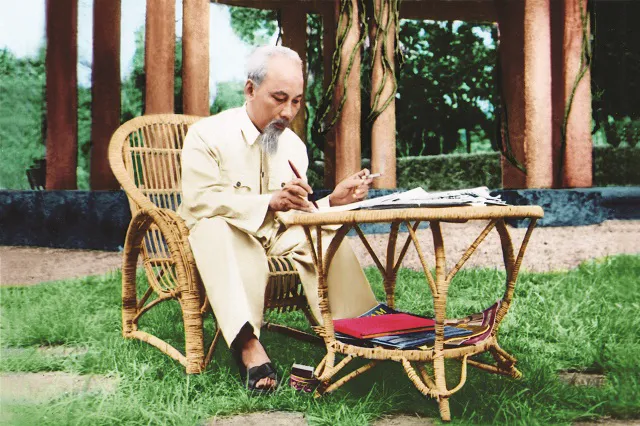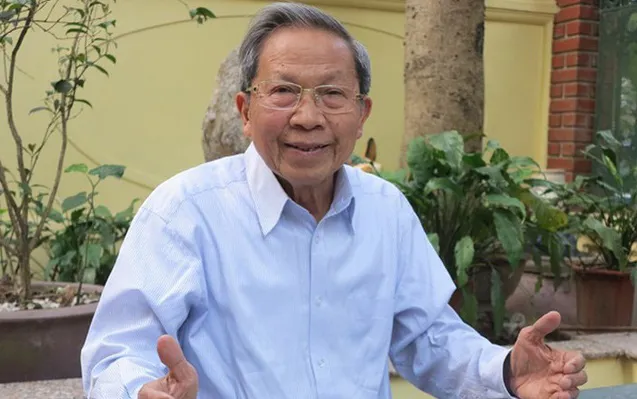For the people – Uncle Ho’s thoughts still remain topical
Vietnamese people celebrated the 131st birthday of Uncle Ho (May 19, 1890-2021) while preparing for the upcoming general election. Uncle Ho's views and thoughts during the country’s first general election still live forever in the hearts of Vietnamese people.
More than 300 photos and documents have been displayed for the first time at Hanoi’s Presidential Palace, detailing the simple life of President Ho Chi Minh who devoted his whole life to the independence, freedom, and prosperous and happy lives of the Vietnamese people.
| A corner of the exhibition shows Uncle Ho's thoughts, morality, and lifestyle. Photo: bvhttdl.gov.vn |
This is one of many activities held to celebrate the 131st birthday of Uncle Ho (May 19, 1890-2021), marking a meaningful event to help people study and follow the President’s thoughts, morality, and lifestyle – especially as the whole country is preparing for the general election of deputies to the 15th National Assembly and People's Councils for the 2021-2026 term on May 23.
Uncle Ho's views and thoughts during the 1946 general election, the first of its kind in Vietnam, to build a real State of the people, by the people and for the people, still remain topical.
Great confidence in the first general election
| President Ho Chi Minh with delegates attending the first session of the First National Assembly at the Hanoi Opera House on March 2, 1946. File Photo |
According to Nguyen Trong Phuc, former Director of the Party History Institute of the Ho Chi Minh National Academy of Politics, the implementation of equality and solidarity for people’s democratic rights is the way that Uncle Ho applied for the fledgling democratic republic of Vietnam, in order to gain success in the first general election on January 6, 1946.
Phuc said President Ho Chi Minh defined universal suffrage as a very basic policy for building a socialist rule-of-law State. The general election aimed to implement democracy and affirm the principle that all State power belongs to the people.
“The 1946 general election was the first time that Vietnamese people implemented democracy and promoted their right to mastery, thereby consolidating the strength of the great national unity bloc and building a strong State, that truly serves the people, not governs the people,” Phuc said.
From the initial policy approved by the Provisional Revolutionary Government, President Ho Chi Minh on September 8, 1945 signed Decree No. 14 deciding to organize the general election in Vietnam.
| President Ho Chi Minh at work. File Photo |
On October 17, 1945, he signed Decree No. 51 on the regulations of the election and setting the election date, expressing the President’s opinions and ideas about a free and democratic electoral regime. He also set out the standards for the National Assembly deputies, who must be talented and virtuous people to shoulder the work for the nation. Those who are elected must make their best efforts to maintain the independence of the Fatherland and strive for the happiness of their compatriots.
At the first National Assembly election, 89% of eligible voters nationwide went to the polls to elect 333 representatives. Nearly 60% of them were members of various parties and the rest were non-party members. President Ho Chi Minh won the election with 98.4% of the votes.
The elected deputies came from a variety of social strata including workers, farmers, revolutionaries, intellectuals, merchants, and artists. The deputies also represented all religions - Catholicism, Buddhism, and Caodaism – ethnic groups and all political parties.
All people go to the polls
| Professor Le Van Cuong. Photo: The Hanoi Times |
Professor Le Van Cuong, formerly of the Strategic Studies Institute under the Ministry of Public Security, told The Hanoi Times that each ballot is a “red brick”. “People are not allowed to be indifferent to their obligation.”
Cuong said of the total 500 National Assembly deputies, there may be a few that have not met the voters’ expectations, but overall the quality of the National Assembly has improved in recent years.
“This is most clearly demonstrated in law discussions and question and answer sessions. I saw that the deputies had spoken frankly with a multi-dimensional look on ’hot‘ issues raising concern in public, and on the basis of representing the people's power. That is a democracy,” Cuong said.
He said during the election process, people are entitled to exercise their ownership from the stage of introducing candidates, participating in constituency conferences to the voting stage on the election day, showing their power through each vote to elect a worthy deputy.
“That process is very democratic and fair. Therefore, each citizen should be alert so as not to be affected by false information. At the same time, I think that, together with the press and media, social organizations need to increase propaganda to help each voter clearly understand their rights in the election,” Cuong said.
All preparations for the election of deputies to the 15th National Assembly and People's Councils for the 2021-2026 term have been basically completed.
In a few days, voters across the country will go to the polls to elect distinguished members who will represent them to shoulder the country’s affairs as Uncle Ho taught in the past.
“The most practical work for the elected people is to build a rule-of-law state of the people, by the people, and for the people,” Cuong said.
At this election, the National Assembly Standing Committee expects that about 500 people will be elected to the 15th National Assembly.













